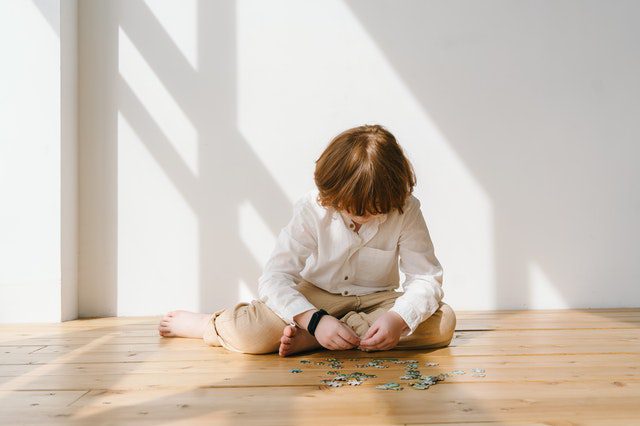When your autistic child is overwhelmed and stressed out, you would do anything to soothe them. Like many parents, you might not know where to begin. Since medications are often harsh on the systems of children, many parents look towards easy and natural remedies that they can use at home. The side effects of most natural remedies are minimal, if any. Another reason natural remedies are popular is that they can be used in conjunction with other therapies for autism, such as speech, Applied Behavioral Analysis (ABA), and even gentle chiropractic care.
5 Natural Remedies To Safely Soothe Your Autistic child When They Experience Distress
1. Diet
There are many conflicting views on the relationship between diet and autism. However, in both my practice and my home, I notice a big difference when certain foods are eliminated. The great thing about working with the diet is that you don’t have to do it all at once. In fact, I recommend starting out very slowly.
You can start by removing processed sugars, artificial sweeteners, and chemicals and dyes that are found in many popular snacks. Even though candy is delicious, it is simply not necessary for the growth and development of a healthy child.
A popular diet that helps kids with autism is the gluten-free, casein-free diet. This diet focuses on eliminating all wheat and dairy. Gluten and casein are proteins that can upset tummies and negatively affect behavior. While it can seem overwhelming at first, you and your child should become easily familiar with it after a few days. As a chiropractor and acupuncturist, and more importantly, a mama of a beautiful little girl with autism, I find that the “gluten-free, casein-free” diet is a relatively easy diet to follow. I use the “80/20” rule – 80% of the time, we stick to the diet, but allow for treats on special occasions about 20% of the time.
It is also important to encourage your child to eat a colorful diet rich in fruits and vegetables. Even though many children with autism experience difficulty with tastes and textures, making sure that they get their nutrients can be a game-changer in how your child reacts to stress.
2. Mindfulness And Deep Breathing
Mindfulness and deep breathing can help to soothe your autistic child. Practicing mindfulness helps kids become more aware of themselves and what they are sensing. And deep, focused breathing helps them get centered by concentrating on the rhythm of their breath. My favorite form of deep breathing or breathwork is a technique called “diaphragmatic breathing.”
Depending on your child, mindfulness and deep breathing may be challenging to teach. My suggestion is that you teach your child when they are in a receptive mood and make it into a game. Then when your child is experiencing extreme stress, you both can help ease them back into a more calm and centered state.
3. Acupressure
Acupuncture and acupressure use specific points on the skin, “acupuncture points,” to calm stress and create balance in the body. Acupuncture uses needles to stimulate these points, while acupressure requires no needles, only your fingers. Because you can do acupressure from the comfort of your home, acupressure is much more convenient. Stimulate each point for 3-5 seconds to start, using your ring finger, to avoid applying too much pressure.
Some acupressure points that I use for stress reduction in my practice are Yintang, Pericardium 6, and Stomach 36.
This is a calming point located on the forehead, right between the eyebrows. Yintang also relieves headaches, dizziness, and nausea.
Yintang
Pericardium 6 (Nei Guan) is located on the inside of the wrist, a few inches above the crease between the two tendons (palmaris longus and flexor carpi radialis). To find Pericardium 6 on your child, take their index, middle, and ring fingers of their opposite hand and place them on the crease. Pericardium 6 soothes anxiety and discomfort in the chest and stomach.
Pericardium 6
Stomach 36 (Zusanli) is located on the shin below the kneecap, about a finger’s width lateral to the tibial tuberosity – the little bump just below the knee cap. This point helps your child to feel grounded and treats many digestive problems such as nausea, bloating, gas, constipation, and diarrhea.
Stomach 36
4. Massage And Gentle Touch
Our bodies hold a lot of tension and stress, and children are no exception. Autistic children especially can hold a lot of stress in their bodies. Massage and gentle touch can be a great way to relieve some of this tension and help to soothe them when they are having a tough time.
A gentle massage can take on many forms. As a parent, you know what natural remedies may soothe your autistic child best. Some children need a light touch, and some respond better to deep pressure. Remember that not all kids with autism like to be touched, so if they say no, don’t push it. But for the kids who do, a massage from someone they trust can help soothe them right out of a meltdown.
5. Essential Oils
Essential oils are concentrated substances extracted from plants, flowers, leaves, bark, roots, and fruit. Oils can be inhaled with a diffuser, sprinkled on a pillow, or even massaged on the skin diluted with a carrier oil (i.e., coconut oil, olive oil). It’s always best to ask a trusted healthcare provider first to make sure your child doesn’t have allergies or sensitivities to the oil. You can even do a “patch test” on a small area of your child’s skin to make sure there is no allergic reaction.
Three great oils for helping to soothe your autistic child are lavender, lemon balm, and bergamot. Lavender is a popular essential oil used to calm anxiety and nervousness and help with sleep. Your child should enjoy this bright fragrance because lemon balm smells like lemons – it’s actually from the mint family. Lemon balm helps reduce anxiety, improves sleep, and boosts cognitive function. The bergamot orange oil is the special ingredient that gives Earl Grey tea its distinctive flavor. It is used to create calm and relaxation, and relieve agitation. Bergamot may increase sensitivity to sunlight, so avoid applying it directly to the skin.
One thing about the essential oils listed above… If you find that using the essential oils is a concern, your child can still benefit from the aromatherapy. Instead of lavender oil, your child can be soothed by inhaling the fragrance of lavender flowers. For lemon balm oil, your child can enjoy the scent of a freshly squeezed lemon or have a cup of lemon balm tea. Instead of bergamot oil, Earl Grey tea is a delicious and calming substitute.
Conclusion
The great thing about natural remedies to soothe your autistic child is the flexibility they offer. And there are so many ways to calm your autistic child. If one of these methods doesn’t work for your child or they seem to be aggravated, no worries. Changes can be made, or you can easily try another method. Allow your child to have a say in what they like. This gives them a sense of control, which in itself can be a calming experience.
References
- Schetler, A. (2021, April 6). The 80/20 rule – Eat healthy and have your cake too. Virtua Health. https://www.virtua.org/articles/the-80-20-rule-eat-healthy-and-have-your-cake-too








